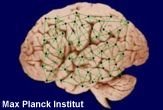
Humans have more copies of a possibly important brain gene in their genomes than other apes, a new study finds.
Called MGC8902, the gene is implicated in the function of the neocortex, the region of the brain that, in humans, is responsible for consciousness, language, and other higher cognitive functions.
The researchers compared the genomes of humans to several ape species, including chimpanzees, gorillas, macaques and baboons. They found that the more closely related the apes were to humans, the more copies of MGC8902 they had in their genomes. Humans had 212 copies of the gene; chimps had 37 copies and macaques 30.
The study, performed by Magdalena Popesco and colleagues at the University of Colorado, is detailed in the Sept. 1 issue of the journal Science.
Gene duplication is important for generating evolutionary novelty. With two identical genes, one continues performing its normal function, leaving the other free to mutate into a new and potentially useful gene. One of the most dramatic instances of gene duplication occurred about 500 million years ago, when a cluster of genes, called the Hox genes, duplicated several times.
Today, Hox genes are responsible for determining where limbs and other body segments will grow during the development of numerous organisms, ranging from fruit flies to humans. Scientists recently figured out how to take one Hox gene and use it to make up for defects in another.
Scientists also recently linked another gene, called HAR1, to the unique cognitive abilities of humans. They found that HAR1, a gene important for brain development in numerous animals, has undergone accelerated evolution in humans, racking up many more mutations than would be expected by chance.
Get the world’s most fascinating discoveries delivered straight to your inbox.
Researchers in the current study predict MGC8902 encodes for multiple sections of a protein, called DUF1220, whose function is unknown but which is abundant in the neocortex and in particular subsets of brain cells.
 Live Science Plus
Live Science Plus





